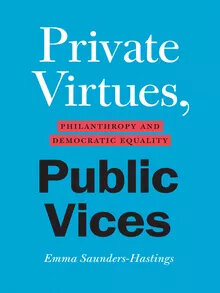Private Virtues, Public Vices: Philanthropy and Democratic Equality
It is lamented that large-scale philanthropy (like everything else) has become politicized and polarizing, subject to conspiracy theories and accusations of whitewashing and being too “woke.” In Private Virtues, Public Vices: Philanthropy and Democratic Equality, Emma Saunders-Hastings reminds us that contributing private wealth for the public good—by definition—has always been a political act.
An assistant professor of political science at Ohio State University, Saunders-Hastings writes like the academic she is, giving careful consideration to historical and contemporary theorists and practitioners—including Alexis de Tocqueville, John Rawls, Peter Singer, Rob Reich, and Erica Kohl-Arenas—and scrupulously qualifying her statements, devoting almost as much space to what she is not arguing as to what she is. She does not deny the merits of philanthropy itself, as Machiavelli did, but seeks “a theory of philanthropy that is political, not just ethical; that applies across multiple levels of idealization; and that is oriented to relational equality”—that is, relations of social and political (not distributive) equality.
“Democratic equality demands of philanthropy and philanthropic regulation not (or not only) better outcomes but changes in the ways that power is distributed and exercised within philanthropic relationships,” she writes.
The book focuses on two objections to philanthropy with regard to democracy: “philanthropy can be an exercise of plutocratic power, and it can be objectionably paternalistic.” The title’s “public vices” are “relational vices—usurpation, subordination, failures of reciprocity, and paternalism,” which can create or reinforce unequal political relationships, even when based on consent. Despite calls for reform, elite philanthropy continues to enjoy both social deference, which limits comparative evaluations of philanthropic donations, and institutional and legal deference, in the form of tax benefits, facilitation of foundation creation, weak oversight, and protection of donor intent.
The book focuses on two objections to philanthropy with regard to democracy: “philanthropy can be an exercise of plutocratic power, and it can be objectionably paternalistic.”
It was not always thus. In ancient Greece, “elite giving was…a negotiated process in which nonelite members of the demos” had the power to vet and accept or reject a public gift. “When some people voluntarily contribute private resources to benefit other people or the public at large, whose judgments about how best to use those resources should be authoritative?” Saunders-Hastings asks. “Can philanthropists wrong their beneficiaries in important ways, even when benefiting them in distributive terms?...A great deal depends on who identifies and articulates the need and who defines the strategy for responding to it.” Again, she is concerned not with “the freedom to give, but the entitlement to control,” or “the question of how control over philanthropic money is to be distributed between giver, recipient, and the wider public.”
The emphasis on empowering those closest to an issue to develop solutions dovetails neatly with sector trends, but as the author notes, this is not a new idea. In The Subjection of Women, John Stuart Mill argues that, having internalized “a damaging patriarchal ideal” that “her destiny is to receive everything from others,” women reproduce subordinating social relations in their charitable work, for “why should what is good enough for her be bad for the poor?” So it is that Jane Addams, who founded Chicago’s Hull House, insisted that the settlement house was not philanthropy, which is “a feudal relation in the sense that it is hierarchical and paternalistic: it asks the poor and working classes to trust others to define their interest and act on their behalf.” “As one of their number has said, [the poor] require only that their aspirations be recognized and stimulated, and the means of attaining them put at their disposal,” she wrote in “The Objective Value of a Social Settlement.”
How, then, should democracies limit the exercise of plutocratic power and paternalism? Don’t we have laws on campaign contributions? Can we “democratize philanthropy” by incentivizing more ordinary citizens to give, so charities are less dependent on gifts from the rich? Saunders-Hastings argues that we overestimate the differences between elite political spending and elite philanthropy and underestimate the differences between elite philanthropy and giving by the rest of us. To put it bluntly: “The wealthy do not need to corrupt a political process when they are able to bypass it altogether.” And foundations “can preserve and transmit influence across decades.”
For example, “[p]ublic, private, and charter schools accepting grants from major patrons such as the Gates, Broad, and Walton Family foundations have been required to restructure themselves in accordance with their donors’ views on best practices,” writes Saunders-Hastings. Such conditions threaten “to erode political equality over time by shrinking the set of decisions which citizens are able to participate as equals in influencing.” Her recommendations for limiting donor control include increasing trustees’ ability to flexibly repurpose gifts and limiting charitable tax deductions to unrestricted gifts and general operating support grants.
According to Saunders-Hastings, 19th-century effort “to systematize private welfare was intimately linked with a paternalistic impulse to remove spending decisions from the control of poor people and instead to vest decision-making power in their benefactors—their ‘trustees’”; the 21st-century emphasis on “strategic philanthropy” and the dearth of general operating support grants are part of that legacy. While many foundations are pledging to increase unrestricted support and guaranteed universal income programs are being piloted across the United States, that it’s taken this long (and a pandemic) is perhaps evidence of how entrenched that impulse is.
Her recommendations for limiting donor control include increasing trustees’ ability to flexibly repurpose gifts and limiting charitable tax deductions to unrestricted gifts and general operating support grants.
Nor is paternalism “less objectionable from donors with accurate information or knowledge about a target population’s needs.” To Nobel laureates Abhijit Banerjee and Esther Duflo’s call on governments and “well-meaning NGOs” to implement “policies that ‘nudge’ (but don’t force) people to do what is best for them,” Saunders-Hastings objects that people have no institutionalized way of holding NGOs accountable for manipulating incentives, even those with data on “what is best for them.” What is needed is “genuine accountability of the paternalizer to the paternalized,” she writes. “Donors who think they have sound nonpaternalistic reasons for giving in ways that might seem paternalistic can show respect for their beneficiaries by offering them justifications for giving in choice-limiting ways rather than treating the provision of benefits as self-justifying.”
Paternalism is especially objectionable in international global health and poverty initiatives, in which extremely asymmetrical donor-beneficiary relationships lack accountability and reciprocity. In addition, donors and NGOs have an obligation to avoid subverting or displacing the host government’s democratic authority and accountability to the local population.
Even mass philanthropy (by a large number of small donors) and associational philanthropy (membership or participatory associations) do not necessarily model or support egalitarian social or political relations, Saunders-Hastings argues, for they focus on the participatory, rather than relational, elements. Tocqueville saw “civic associations not merely as vehicles for citizens’ active participation but as sites for negotiating social (and especially class) relationships,” she notes; “ordinary citizens, by associating, can constitute very opulent, very influential, and very powerful entities—in a word, they can play the role of aristocrats.” The crowdfunding site DonorsChoose.org claims that “[y]ou can give as little as $1 and get the same level of choice, transparency, and feedback that is traditionally reserved for someone who gives millions.” And while relationships within a giving circle may be democratic, there often is little reciprocity between the givers and the recipients.
One model Saunders-Hastings lifts up is mutual aid, with its “absence of conditions on aid, responsiveness to the needs and desires of beneficiaries, and the cultivation of respectful and sustained relationships.” Similarly, community organizing “insist[s] on a more immediate democratization of power. We are to relate as equals now, not at some future point after which philanthropic objectives have been achieved.”
To be sure, the concern over elite philanthropy wielding plutocratic, paternalistic political power is not new. Many of us live with the moral tension between philanthropy’s well-intended benefit and the unequal power dynamics. What Saunders-Hastings illuminates in Private Virtues, Public Vices: Philanthropy and Democratic Equality is the breadth and depth of its impact on relational equality—that “[p]hilanthropy can neither be a matter of individual conscience alone nor folded into a public conception of justice; it is a site for negotiating social and political relationships between people, not just a delivery vehicle for personal moral commitments or public goods.”
The book dissects that tension as a political one that has evolved and been critiqued over the centuries. Given the sector’s recent efforts to acknowledge and address the power imbalance inherent in philanthropy and its role in perpetuating inequities, center those closest to the issue in developing solutions, and award more unrestricted grants, the book is timely—and timeless, for it goes beyond calling for reforms to suggest a framework for thinking not only about philanthropy but also about democracy, equality, and justice.
Kyoko Uchida is features editor of Philanthropy News Digest.







